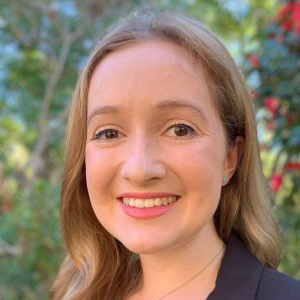

A once-in-a-lifetime school trip to the other side of the world set Alison Campbell firmly on the path to studying a PhD in chemistry, and the University of Sydney student is determined to use the knowledge she gains to become a force for good.
A member of Dr Girish Lakhwani’s Molecular Photophysics Group, Alison was among the millions of researchers globally who found their plans changing amid the rapid escalation of the COVID-19 pandemic in early 2020.
After initially intending to continue working on single molecule spectroscopy, the logistical challenge of gaining access to shared equipment and the sudden impossibility of travelling to Melbourne for training prompted a shift to the frontline in our battle to improve renewable energy generation capacity.
“I’m working on organic solar cells,” she said.
“It’s not organic like you can buy in a health food shop. You can make these types of solar cells lightweight, flexible, and transparent. They don’t perform quite as well as silicon yet, but they are a really exciting option for the future.
“Many people around the world are having this battle to try and get the most efficient solar cells. While we want to make more efficient solar cells, we’re more focused on figuring out what’s happening inside the solar cell, how it’s working, which we call the photo-physics.”
For Alison, the opportunity to work alongside a postdoctoral researcher on a day-to-day basis and the ease of cooperation and collaboration enabled by the structure of Exciton Science is a major advantage in pursuing her goals.
“Having other people with expertise and being able to learn from them in the lab is really valuable,” she said.
“We want to set up a feedback loop between theory, experiment and synthesis of the molecules. It’s something that would be a lot harder to achieve without the Centre.”
The laboratory appears to have always been a likely destination for Alison, but any lingering questions about her pathway after high school were settled with finality when an extraordinary opportunity arose prior to starting her High School Certificate.
“I had a logical, rational mind,” she said.
“I always liked science, I hated English. Don’t tell my English teacher – (but) I think she already knew.
“I was really lucky enough to be selected in Year 10 by my high school to go on an exchange program to Cambridge University for science. It was a really incredible opportunity. Spending time at Cambridge University is inspiring.”
While many students have more than enough on their hands grappling with deadlines and progressing demanding projects, Alison has dedicated herself to outreach activities and communicating about science throughout her time at the University of Sydney, starting with a first-year role as a demonstrator to high-school students.
“I think it’s so important to share what we know,” she said.
“I do feel, strongly, that having the scientific knowledge we have is a really great privilege. It’s not just a me thing, it’s we thing. It should be the case that everyone can be involved. You don’t go to a music concert only if you study music.”
And Alison is aware that, in a fragmented political and social landscape, spreading the word about her research in an informative, engaging manner isn’t just a question of entertainment.
“There’s this age of fake news or misinformation,” she said.
“You can invent anything you want and put it on the internet and call it truth. I think it’s so important to have qualified voices, to be able to find out what the real, truthful situation is. Especially things like climate change. It’s got a really large impact on the world. No one on their own can solve global warming. We all need to work together and value each other’s expertise.”
See more of Alison’s involvement in the Centre in the following sections:

Many people around the world are having this battle to try and get the most efficient solar cells. While we want to make more efficient solar cells, we’re more focused on figuring out what’s happening inside the solar cell, how it’s working, which we call the photo-physics.”